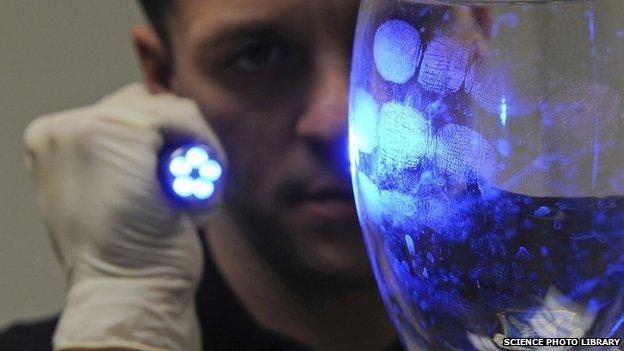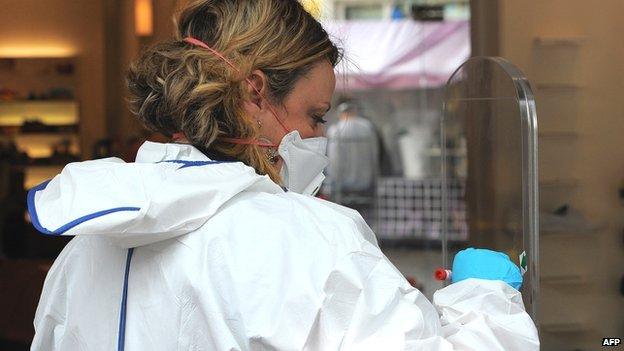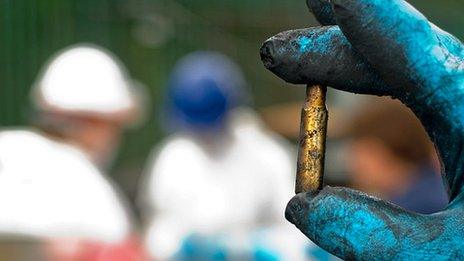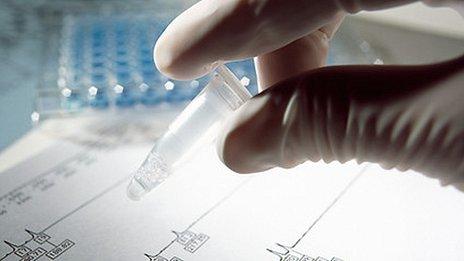Warning by spending watchdog over forensic science work
- Published

Forensic science standards risk slipping since work was transferred to in-house police labs and private firms, the spending watchdog has warned.
The National Audit Office said there was too little data on forensic services used by forces and companies risked being pushed out of the market.
Crime scene evidence was analysed by the Forensic Science Service in England and Wales until it was axed in 2012.
The Home Office said it monitored the forensic science market closely.
Police are commissioning more work from their own laboratories - with an estimated £122m being spent this year - but the NAO said many in-house labs did not meet accreditation standards.
The NAO said the Forensic Science Regulator, which monitors the work, does not have complete data on which police labs are accredited and has no statutory powers to enforce them to comply with standards.
Reflecting concerns from within the forensics community, the NAO paper said, external: "If suppliers did pull out of the market this could present a risk of service interruption, and lack of capacity could hold up criminal cases or cause them to collapse."
The report raised doubts about the effectiveness of Home Office oversight, pointing to what it describes as a lack of data on forensics spending by police forces.

The Home Office collects figures on forensic services procured through a tendering system called the National Forensic Framework but this framework is not compulsory and the department lacks data on those procured outside the system.
The Commons Science and Technology Committee has warned of risks to forensic provision in two previous reports.
Committee chairman, Labour MP Andrew Miller, told BBC News: "What the NAO have identified does not surprise me at all.
"Should it worry us? Yes. How can anyone be certain, given the confusion, as to what is going to happen to the integrity of our whole criminal justice system when you can't identify what the costs are - and therefore where benefits lie?"
There are concerns in the private sector that police labs are able to operate more cheaply, creating an "unequal playing field".

Forensic transition: A timeline
December 2010 - The government announces plans to close the Forensic Science Service (FSS), a government-owned company (GovCo) which employs 1,600 staff. The government says it is losing about £2m a month.
July 2011 - An MPs' inquiry concludes that the government did not consider the wider impacts of closing the FSS, and that financial reasons took precedence.
October 2011 - In its official response to the inquiry, the government argues that allowing the FSS to enter administration would have caused serious damage to the criminal justice system.
March 2012 - The FSS officially shuts its doors, with operations transferred to private companies and in-house police labs.
July 2013 - A follow-up inquiry by the Commons Science and Technology Committee concludes that major crimes could go unsolved unless the government does more to support forensic science.
November 2013 - The government launches a consultation over plans to boost the powers of the forensic regulator in England and Wales.

A Home Office spokesman said: "Police reform is working and we continue to ensure forces have access to the best possible forensic services, whilst protecting taxpayers from the £2m losses that were made by the Forensic Science Service each month.
"'Police spending with private forensic suppliers has reduced for a number of reasons; such as falling crime, lower costs due to improved processes and greater competition.
"It is for police and crime commissioners and chief constables to decide how to spend their budgets. However, we monitor the market closely to make sure it remains competitive and it continues to provide forces what they need."
Scotland and Northern Ireland have their own publicly-funded forensic science providers; the Scottish Police Services Authority Forensic Services and Forensic Science Northern Ireland.
- Published25 July 2013

- Published8 February 2013

- Published15 November 2013
